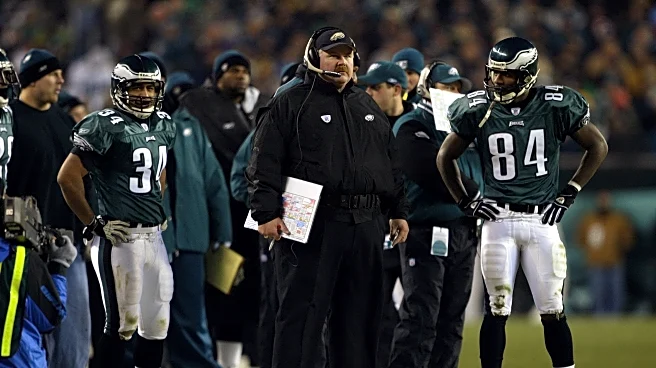I came of age as an Eagles fan at the perfect time to understand the ups and downs that life brings. In the early 2000s, the Birds became just as synonymous with regular season success as they were with postseason
failures. The Eagles soared to previous unseen heights for their franchise in the Super Bowl era only for things to come crashing down in late January.
As someone born in the mid 1990s, it instilled an element of fatalism in me. That was the quintessential Eagles experience: watching games with family and friends, huddled around a television for the NFC Championship Game only for the Birds to lose in crushing fashion and for me to beg my parents to stay home from school the following day (I was always sent to school anyway despite my pathetic requests).
That was all Andy Reid, the Eagles’ head coach from 1999 to 2012, on both accounts. Reid had built a winning program in Philadelphia. The Eagles were always competitive, always playing meaningful football. That was way, way more than fans of some older generations could say, having seen some true wastelands themselves. In that sense, I was lucky. I got to watch a team with talent on both sides of the trenches and a real franchise quarterback. For a brief, illustrious season, I also watched the best receiver in the NFL score touchdowns in midnight green. Things were good, but not good as they could’ve been or, in the minds of people across the Delaware Valley, should’ve been.
Reid, again, always had the Eagles in the mix, but never brought that parade to Broad Street that everyone wanted. When the franchise and Reid parted ways following a brutal 4-12 season in 2012, it was the best thing for all parties. It wasn’t an indictment on Reid’s overall standing as a head coach and a football mind, but things had run their course and become stale. It was time. It was beyond time really.
The split put both the Eagles and the Chiefs, Reid’s new team, on the path to championships. The Chip Kelly era in Philly was explosive to start, but ended in disaster in 2015. The Birds then hired Doug Pederson, Reid’s offensive coordinator in Kansas City and a former Birds coach and player in his own right, to bring back the stability of the Reid years. He bettered Reid within two years, winning the Eagles’ first Super Bowl in Feb. 2018 before Reid even hoisted a Lombardi Trophy himself.
Reid, armed with Patrick Mahomes in Kansas City, has ripped off a handful of Super Bowl appearances for the Chiefs, including three wins. One of those losses, of course, came to the Eagles this past February in New Orleans where the Birds dominated the Chiefs in a 40-22 win that wasn’t remotely as close as that score would indicate.
I have no regrets about the Eagles letting Reid go and seeing him turn into a consensus top-three coach in league history, nor should any Philadelphia fan reading this. It was necessary. All those wonderful moments in 2017 and over the last few seasons happened because the Eagles ripped the proverbial Band-Aid off and started anew.
Reid’s legacy still lives on in Philly when it comes to the team’s front office and roster-building style, too. Howie Roseman began as a front office intern during Reid’s time in Philly, working his way up to general manager while Reid was still the head coach. Reid’s penchant for constructing the roster from the lines out, heavily investing in the trenches in the NFL Draft and with big money contracts, became a hallmark for the franchise and is why the Eagles have all these Super Bowl appearances in the post-Reid era. There is no Pederson telling Nick Foles, “Yeah, let’s do it,” about the Philly Special if Reid didn’t bring Pederson to Philly in the first place in 1999. Hell, Foles started some games at quarterback in Reid’s final season with the Birds. That’s before even getting to the likes of Brandon Graham, Jason Kelce and Fletcher Cox, who all played under Reid as well.
When the Eagles face Reid in Kansas City for a Super Bowl rematch this Sunday, I’ll think of him as the guy whose best days put me on the path to being obsessed with the Eagles and who, on his worst days as a coach, helped morph me into a crazed weirdo when it comes to sports. I guess we can call it a wash.








